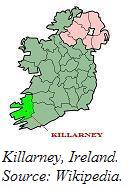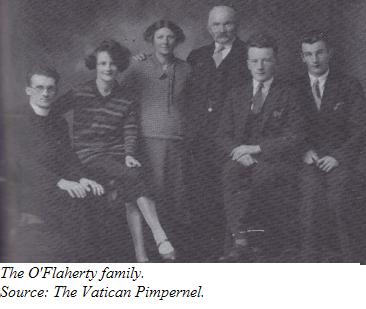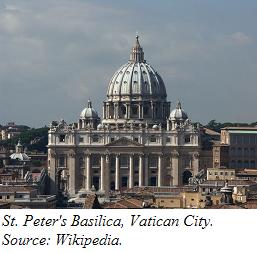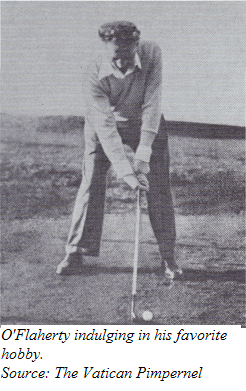An Irish Childhood
 Hugh Joseph O’Flaherty was born on February 28th, 1898, in County Cork, Ireland. According to the custom of the time, his mother Margaret had returned to her family home of Lisrobin for the birth of Hugh, her first child. Margaret’s husband, James O’Flaherty, was a sergeant in the Royal Irish Constabulary, posted to Killarney, in County Kerry. This small and scenic Irish town was where Hugh, his brothers Jim and Neil, and his sister Bride would spend their childhoods.
Hugh Joseph O’Flaherty was born on February 28th, 1898, in County Cork, Ireland. According to the custom of the time, his mother Margaret had returned to her family home of Lisrobin for the birth of Hugh, her first child. Margaret’s husband, James O’Flaherty, was a sergeant in the Royal Irish Constabulary, posted to Killarney, in County Kerry. This small and scenic Irish town was where Hugh, his brothers Jim and Neil, and his sister Bride would spend their childhoods.
It wasn’t the easiest time to grow up. Ireland was under the control of the British, denied “Home Rule,” or the right to form a government of its own. Any movement toward Irish independence was quickly and sometimes brutally suppressed by the British army forces that occupied the country. The most notorious of these was a group called the “Black and Tans,” which was primarily made up of petty criminals who’d shortened their prison sentences by agreeing to serve in the army. The members of the Royal Irish Constabulary had the awkward job of helping enforce the unpopular British policies. Eventually, like many of his colleagues, James O’Flaherty resigned rather than continue to be torn between duty and patriotism. All of these events made a deep impression on the young Hugh.
 From his early teens, Hugh knew that he wanted to be a priest, and he attended a monastery school in Killarney and a Jesuit seminary in Limerick toward that end. He was rather better at sports than studying, however. After leaving the Constabulary, his father had become the caretaker for the Killarney Golf Club. The O’Flaherty family home bordered directly on the golf course, and young Hugh soon developed a passion for the game, along with other outdoor pursuits.
From his early teens, Hugh knew that he wanted to be a priest, and he attended a monastery school in Killarney and a Jesuit seminary in Limerick toward that end. He was rather better at sports than studying, however. After leaving the Constabulary, his father had become the caretaker for the Killarney Golf Club. The O’Flaherty family home bordered directly on the golf course, and young Hugh soon developed a passion for the game, along with other outdoor pursuits.
Hugh was also known for his fierce dedication to the Irish Nationalist cause. For him, as for many of his peers, it was not just a philosophical question. During the year of 1920, four of Hugh’s classmates were shot by the Black and Tans in four separate episodes. Hugh himself was once taken in for questioning simply because he’d attended the funerals of two other slain supporters of Irish independence. Every time Hugh and his student friends heard about more injustices like these, they would pound on their table in the refectory and roar, “One day we’ll sink the entire British navy!”
When in Rome
 In 1922, Hugh went to Rome to complete his studies. He entered Urban College of the Congregation for the Propagation of the Faith, and amazed his former teachers by earning his theology degree in just one year. Hugh was ordained in 1925, and spent another two years at Urban College, serving as vice-regent and earning three doctorates in Divinity, Philosophy, and Canon Law.
In 1922, Hugh went to Rome to complete his studies. He entered Urban College of the Congregation for the Propagation of the Faith, and amazed his former teachers by earning his theology degree in just one year. Hugh was ordained in 1925, and spent another two years at Urban College, serving as vice-regent and earning three doctorates in Divinity, Philosophy, and Canon Law.
In 1934, O’Flaherty was appointed a Monsignor. He traveled to Egypt as a secretary to one Msgr. Torquato Dini, a diplomat of the Catholic Church; but Dini died suddenly while in service. O’Flaherty had to take over—and in the process, discovered that he possessed an enormous talent for diplomacy. This fact was not lost on his superiors. For the next four years, O’Flaherty was sent on diplomatic missions to places as diverse as San Domingo and Haiti (where he was decorated by the presidents of both islands for his work on famine relief), and Czechoslovakia (where the nature of his assignment has never been made clear, although it’s likely it had something to do with the hostility that was beginning to be obvious all throughout Europe). His work in all these matters must have been exemplary, for in 1938 he was recalled to Rome and appointed to the Holy Office.
The Holy Office (now the Congregation for the Doctrine of the Faith) is the supreme court of the Catholic Church. Its officials deal with challenges to the Faith, handle controversies over the Church’s doctrines and teachings, and examine claims of visions and miracles. As an organization, the Holy Office dates back to 1560—when it was known as the Inquisition. It was here that O’Flaherty would spend his career, starting as Scrittore, or Writer, and rising to the position of Primo Notario, or Head Notary, the official who draws up the final drafts of all the decisions and signs them.
 O’Flaherty’s work was very important to him. So was his golf game. He was Italy’s amateur golfing champion (never mind that there were diocesan regulations against priests playing golf). He was also a superb boxer, played a good game of handball, and was a decent hurler. Six-foot-two, raw-boned and strong, with cheap wire-rimmed glasses and an Irish brogue, O’Flaherty did not look, or act, like a typical cultured Church official. But Roman high society was crazy over him. He regularly golfed with Mussolini’s son-in-law, and with the former king Alfonso of Spain. He was invited to all the best parties. He knew everyone, and everyone knew him. And they adored him. Some of O’Flaherty’s colleagues in the Church raised their eyebrows over his behavior, but others appreciated his unique gifts, and used him as a sort of unofficial ambassador in many confidential matters.
O’Flaherty’s work was very important to him. So was his golf game. He was Italy’s amateur golfing champion (never mind that there were diocesan regulations against priests playing golf). He was also a superb boxer, played a good game of handball, and was a decent hurler. Six-foot-two, raw-boned and strong, with cheap wire-rimmed glasses and an Irish brogue, O’Flaherty did not look, or act, like a typical cultured Church official. But Roman high society was crazy over him. He regularly golfed with Mussolini’s son-in-law, and with the former king Alfonso of Spain. He was invited to all the best parties. He knew everyone, and everyone knew him. And they adored him. Some of O’Flaherty’s colleagues in the Church raised their eyebrows over his behavior, but others appreciated his unique gifts, and used him as a sort of unofficial ambassador in many confidential matters.
 From his early teens, Hugh knew that he wanted to be a priest, and he attended a monastery school in Killarney and a Jesuit seminary in Limerick toward that end. He was rather better at sports than studying, however. After leaving the Constabulary, his father had become the caretaker for the Killarney Golf Club. The O’Flaherty family home bordered directly on the golf course, and young Hugh soon developed a passion for the game, along with other outdoor pursuits.
From his early teens, Hugh knew that he wanted to be a priest, and he attended a monastery school in Killarney and a Jesuit seminary in Limerick toward that end. He was rather better at sports than studying, however. After leaving the Constabulary, his father had become the caretaker for the Killarney Golf Club. The O’Flaherty family home bordered directly on the golf course, and young Hugh soon developed a passion for the game, along with other outdoor pursuits.  Hugh Joseph O’Flaherty was born on February 28th, 1898, in County Cork, Ireland. According to the custom of the time, his mother Margaret had returned to her family home of Lisrobin for the birth of Hugh, her first child. Margaret’s husband, James O’Flaherty, was a sergeant in the Royal Irish Constabulary, posted to Killarney, in County Kerry. This small and scenic Irish town was where Hugh, his brothers Jim and Neil, and his sister Bride would spend their childhoods.
Hugh Joseph O’Flaherty was born on February 28th, 1898, in County Cork, Ireland. According to the custom of the time, his mother Margaret had returned to her family home of Lisrobin for the birth of Hugh, her first child. Margaret’s husband, James O’Flaherty, was a sergeant in the Royal Irish Constabulary, posted to Killarney, in County Kerry. This small and scenic Irish town was where Hugh, his brothers Jim and Neil, and his sister Bride would spend their childhoods.  In 1922, Hugh went to Rome to complete his studies. He entered Urban College of the Congregation for the Propagation of the Faith, and amazed his former teachers by earning his theology degree in just one year. Hugh was ordained in 1925, and spent another two years at Urban College, serving as vice-regent and earning three doctorates in Divinity, Philosophy, and Canon Law.
In 1922, Hugh went to Rome to complete his studies. He entered Urban College of the Congregation for the Propagation of the Faith, and amazed his former teachers by earning his theology degree in just one year. Hugh was ordained in 1925, and spent another two years at Urban College, serving as vice-regent and earning three doctorates in Divinity, Philosophy, and Canon Law.  O’Flaherty’s work was very important to him. So was his golf game. He was Italy’s amateur golfing champion (never mind that there were diocesan regulations against priests playing golf). He was also a superb boxer, played a good game of handball, and was a decent hurler. Six-foot-two, raw-boned and strong, with cheap wire-rimmed glasses and an Irish brogue, O’Flaherty did not look, or act, like a typical cultured Church official. But Roman high society was crazy over him. He regularly golfed with Mussolini’s son-in-law, and with the former king Alfonso of Spain. He was invited to all the best parties. He knew everyone, and everyone knew him. And they adored him. Some of O’Flaherty’s colleagues in the Church raised their eyebrows over his behavior, but others appreciated his unique gifts, and used him as a sort of unofficial ambassador in many confidential matters.
O’Flaherty’s work was very important to him. So was his golf game. He was Italy’s amateur golfing champion (never mind that there were diocesan regulations against priests playing golf). He was also a superb boxer, played a good game of handball, and was a decent hurler. Six-foot-two, raw-boned and strong, with cheap wire-rimmed glasses and an Irish brogue, O’Flaherty did not look, or act, like a typical cultured Church official. But Roman high society was crazy over him. He regularly golfed with Mussolini’s son-in-law, and with the former king Alfonso of Spain. He was invited to all the best parties. He knew everyone, and everyone knew him. And they adored him. Some of O’Flaherty’s colleagues in the Church raised their eyebrows over his behavior, but others appreciated his unique gifts, and used him as a sort of unofficial ambassador in many confidential matters.